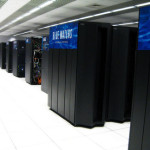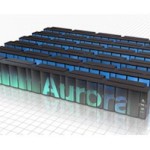In this special guest post, Professor Jack Dongarra sits down with Mike Bernhardt from ECP to discuss the role of Dongarra’s team as they tackle several ECP-funded software development projects. “What we’re planning with ECP is to take the algorithms and the problems that are tackled with LAPACK and rearrange, rework, and reimplement the algorithms so they run efficiently across exascale-based systems.”
Archives for May 2017
NCSA Blue Waters Report Shows Economic Benefits of HPC
The importance of supercomputing on local and national economic prosperity has been highlighted by a recent study which reported that its Blue Waters project to be worth more than $1.08 billion for the Illinois’ economy. The study was completed by the published by the National Center for Supercomputing Applications at the University of Illinois at Urbana-Champaign.
Horst Simon to be Program Chair for ISC 2018
ISC 2017 may be just around the corner, but the conference team is already busy planning the show for next year. Today they announced that Prof Horst Simon will be the ISC 2018 program chair. “ISC 2018 topics will embrace a range of subject matter critical to the development of the high performance computing field, which, in return, impacts the quality of human life.”
Video: Optimizing HPC Service Delivery at Boeing
Jim Glidewell from Boeing presented this talk at the PBS Works User Group. “There are multiple elements to providing an effective and efficient HPC service. This presentation will share some of our strategies for extracting maximal value from our HPC hardware and providing a service that meets the needs of our engineering customers.”
HPC as a Service for High Performance Video Rendering
In the past 5 years, GPUs have gotten even more powerful so rendering tasks can be completed even faster than before. Katie (Garrison) Rivera, of One Stop Systems, explains how HPC can act as a service for high performance video rendering.
Supercomputing More Efficient Paper Production with HPC4MFG
Industry is collaborating with researchers at LBNL to significantly reduce paper production costs and increase energy efficiencies. “The major purpose is to leverage our advanced simulation capabilities, high performance computing resources and industry paper press data to help develop integrated models to accurately simulate the water papering process.”
Ohio Supercomputer Center to Boost STEM Education at annual Summer Institute
Twenty Ohio high school students were selected to attend the Ohio Supercomputer Center’s 28th annual Summer Institute, June 4-16 at Ohio State University. These academically gifted students will investigate complex science and engineering problems while discovering the many career opportunities in science, technology, engineering and mathematics (STEM) fields. “The Summer Institute allows students to gain a better understanding of what scientists and engineers do,” Guilfoos said. “SI gives students real-world knowledge and experience that they can use for the rest of their lives.”
In Search Of: Radio Free HPC on the Hunt for the Aurora Supercomputer
In this podcast, Rich notes that recent reports on the Aurora supercomputer were incorrect. According to Rick Borchelt from the DoE: “On the record, Aurora contract is not cancelled.” Before that, we follow Henry on an unprecedented shopping spree at Best Buy.
Adnan Khaleel on how Dell EMC Delivers HPC in the Cloud
In this video from the Dell EMC HPC Community meeting, Adnan Khaleel, Global Strategist for HPC at Dell describes how the company works with partners to deliver HPC in the Cloud. “By tapping into on-demand cloud resources as needed, your organization can access high-end computing power without the additional capital investment of building and maintaining your own HPC cluster.”
Increase in Wattage Trends Make Versatile Liquid Cooling the New Norm
Wattages are rising so high that to cool the nodes containing the highest performance chips used in HPC leaves one with little choice other than liquid cooling to maintain reasonable rack densities. Asetek explores how an increase in wattage trends is pushing the HPC industry toward more versatile liquid cooling options.













